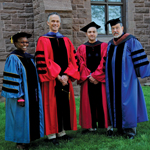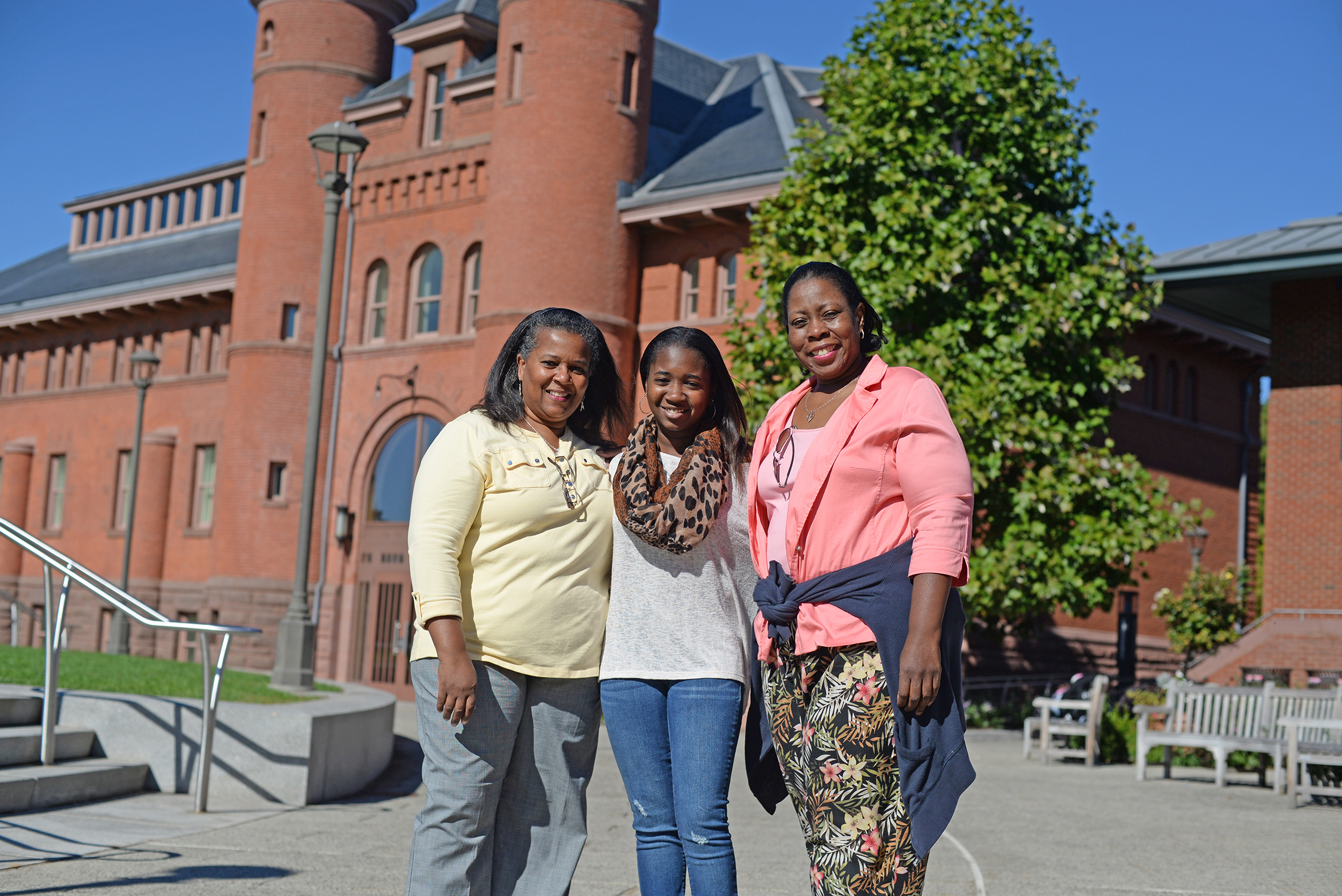New Career Service Fellows Reflect on Their Opportunities
David Skaggs ’64, executive director, Center for Democracy & Citizenship, and a former congressman from Colorado, met with the Fellows during a special dinner just prior to his panel discussion, open to all students, on Careers in Congress.
Melanie McCrea ’06 learned about Wesleyan’s new Career Service Fellows program from an e-mail she received at an Internet cafe in Argentina, where she was spending a semester taking classes and doing some tutoring. It sounded ideal, she thought.
On campus, Zach Potter-Vose ’06 initially ignored the announcement. So many other students had done more than he, and besides, he was too busy to apply. He and a friend were arranging a reggae barbecue for the Wesleyan residents of Low-Rise and their neighbors in the low-income Traverse Square housing. It was in explaining this excuse to Cathy Crimmins Lechowicz, director of community service and volunteerism, that he saw the irony. He applied, was accepted, and says that the benefits of the fellowship have gone far beyond the financial.
“It was a really big confidence boost,” says Potter-Vose, “to realize that others see this social commitment in me.”
This new, alumni-funded initiative reduces post-graduation debt. The hope is that easing the financial burden may allow these students–who have demonstrated commitment to public and community service–to choose a career of service and social responsibility less financially remunerative than some other careers, but more compatible with their values and convictions of serving others.
Modeled after loan-forgiveness programs in several top law and public policy programs, the fellowship seems to be unique at the undergraduate level, explains one of its founders, Jonathan Soros ’92. The money, he notes, is provided to the students upfront, as a fellowship. “The idea is that service is part of everybody’s life. The program is about finding people who will nurture that in their careers and throughout their lives,” he says. Soros cites President Doug Bennet ’59 as a model for this, with his leadership roles in the State Department, National Public Radio, and Wesleyan as highlights.
The ’05-’06 fellows, chosen last spring, began this year with a dinner at the president’s house, at which they were introduced to their program founders. Various events followed throughout the year.
“We try to give students practical information that applies to the real world,” says Jim Kubat, assistant director of the Career Resource Center. “For example, we organized a series of workshops that gave students concrete insight into how they could start or manage a nonprofit organization or a new program.” The workshops were led by experienced alumni volunteers who shared their knowledge of NPO startups and management.
“The program gave us access to a lot of people who would have been inaccessible otherwise,” said Alison Koch ’06, from Orlando, Fla., a neuroscience and biology double-major.
“The speakers were inspirational; they had an idea and went for it wholeheartedly; it was great to hear about their successes and their challenges,” says McCrea, back from Argentina.
The alumni, also, have enjoyed the interactions. “I’ve noticed that the level of achievement of students in the collegiate world is extraordinary,” says Soros. “Students who are seniors in college have resumes with real life achievements.”
In her first year at Wesleyan, Koch and a friend founded the Student Campaign for Child Survival, which is dedicated to providing more funding for Unicef, USAID, and children’s health programs. She and a few friends also founded Students Take Action Now: Darfur (STAND). She looks forward to a career in public health, although she is torn between lab research and community interaction.
Awakening possibilities has been a theme for students.
Dawn Burley ’06, whose major is Latin American Studies with a concentration in sociology, says that the program made it possible for her to accept an unpaid internship at Rosie’s Place, a social service organization located in one of Boston’s poorest neighborhoods.
“All the things I cared about; the social justice, the accepting atmosphere–it was all present. There was no way I could have done it if it weren’t for the fellowship,” she says. She also appreciated the dinner with donors. “It was so important to me, to be able to meet these amazing people who gave me this opportunity.”
The opportunity has helped some fellows refine their focus and others to consider a broader range of options.
“After being at Rosie’s place and listening to the social workers talk about their jobs, I’m thinking about law school,” says Burley. “They told me that they love their jobs, but find it frustrating because they can only go so far and then they slam into the system. I’m thinking about doing policy law. That way, I can help change the system.”
McCrea also found the fellowship raised her horizons. “The fellowship has helped me shape more ambitious goals; I have a greater awareness of possibilities and belief in what I could actually achieve. It’s similar to what Wesleyan has done for me,” she says, “It’s shown me greater possibilities for myself than I knew existed.”


